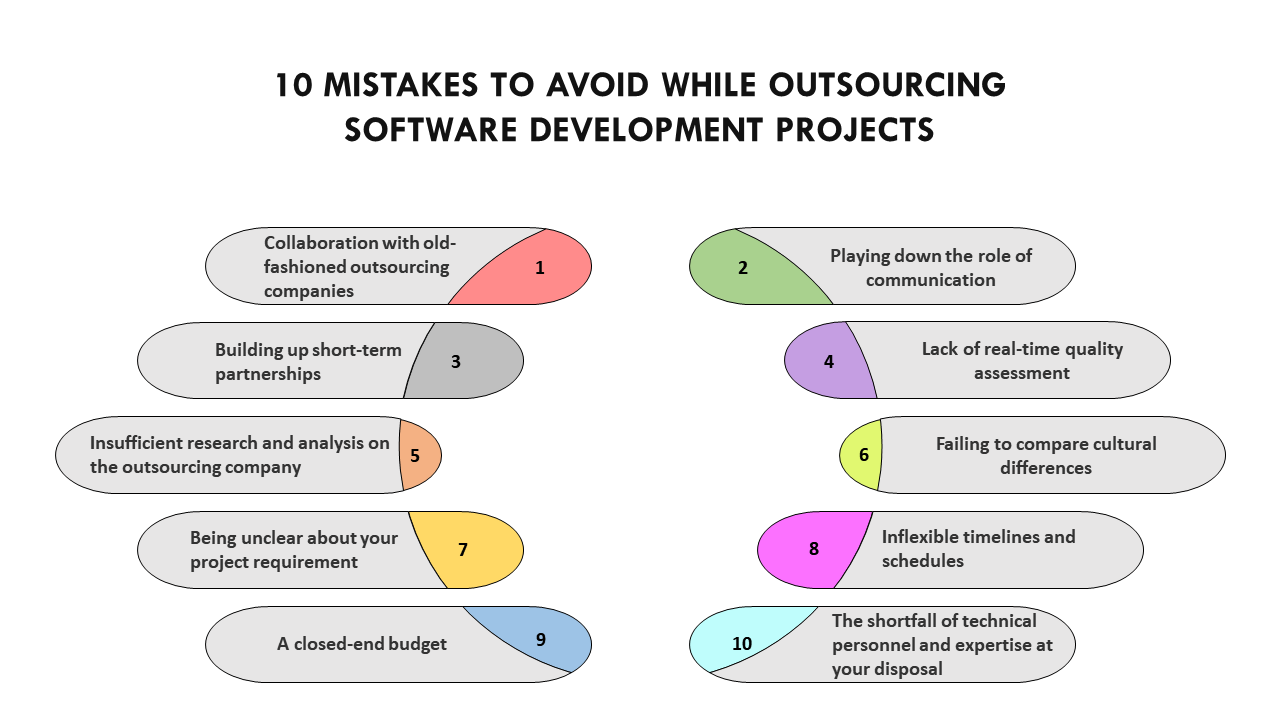10 MISTAKES TO AVOID WHILE OUTSOURCING SOFTWARE DEVELOPMENT PROJECTS

In its simplest sense, outsourcing is handing over the responsibility of certain
business projects to a
qualified third-party vendor. Widely considered a cost-effective arrangement, it
can lower the cost of
production and market price and boost competition.
For most start-ups and small businesses in the technological sphere, the secret
to their business
success lies in picking out the right outsourcing partner. The right outsourcing
partner can significantly
bring down costs and work pressure.
Set aside the advantages, tech start-ups and IT businesses often commit crucial
mistakes while outsourcing.
Those mistakes can result in unforeseen failures, additional costs, and a waste
of time. Therefore, anticipating
and planning to overcome these pitfalls would be a big step in the right
direction.
Whether you are running a tech start-up or an established IT company, here are the
ten mistakes you should
avoid while you outsource your software development projects.

1. Collaboration with Old-fashioned Outsourcing Companies.
When you focus mainly on low costs, you can end up in collaboration with
old-fashioned companies – the companies that are not only out of sync with the
current market trends but also may be unaware of legalities, the contrast in
culture, work ethics, and internet capacity in your country. The collaboration
may bust your budget or may bring your whole project to a standstill.
2. Build up Short-term Partnerships.
A lack of long-term goals and partnerships in an era of unpredictable, volatile
market conditions
would be a serious mistake from your side. When you engage in a short-term
partnership with an
outsourcing company, it provides very little time for the company to understand
your project and your
business. It affects the final product quality and puts a bitter end to your
relationship with the outsourcing company.
3. Insufficient Research and Analysis on The Outsourcing Company.
A major mistake most companies make is picking out an outsourcing company based
mainly on low costs.
Even though cost-effectiveness plays an important role, focusing only on it will
cause glitches in your project
or lead to its failure. You should also consider factors like the outsourcing
company’s expertise and portfolio,
feedback and reviews, and mode of operation. Invest time for research and
preparation, and consider it as an
investment in your project.
4. Being Unclear About Your Project Requirements.
If you don’t know where you are going, you might wind up someplace else. It
applies well to your
software development projects. Never embark on a project unless you are clear
about your requirements
and provide a clear vision of business goals to your team. You should be able to
present your project’s vision
and mission to your outsourcing partner in a clear-cut manner that your
outsourcing partner must understand
exactly what you want and devise effective ways to implement your idea.
5. A Closed-end Budget.
Approaching a dynamic process like software development with a shoestring or a
closed-end budget is
one of the biggest blunders you can make. The cost of production will keep on
changing during project
development, and maintaining a fixed-price approach can hamper new developments.
It would always be
better to keep an open-ended budget until the successful completion of the
project.
6. Play Down the Role of Communication.
Good communication with your outsourcing partner can do wonders for your
business. Assigning an
efficient project manager with excellent communication skills helps team
building and provides the team
with a clear vision. A project manager should also be responsible for
maintaining strict timelines and
budgets for the project.
7. Lack of Real-Time Quality Assessment.
Real-time quality assessment is a crucial part of the software development
process. Failure in real-timereal-time testing of any software results in errors
that will invite bugs and glitches, lead to poor feedback and reviews for the
software, and your brand. Appointing a full-time tester for your project can
guarantee the effectiveness and user-friendliness of your software project.
8. Fail to Compare Cultural Differences.
In an outsourcing project, you will be working with a team culturally different
from yours. To enhance the efficient cooperation between your in-house and the
outsourcing teams, you need to make them aware of your work ethics and cultural
norms.
9. Inflexible Timelines and Schedules.
Software development is a time-consuming process. It requires patience, hard
work, and the skill to
handle the unpredictability of the project schedules. It is always better to
plan and implement your
schedules around software development rather than trying to align the process
with your strict timeline.
For the proper functioning of the project, rather than multitasking by trying to
take care of every
department by a single person, it would be better to appoint skilled personnel
at every department.
It can reduce the pressure and smoothen the development of the project.
10. The shortfall of Technical Personnel and Expertise at Your
Disposal.
Your outsourcing company will have required technical expertise, but utterly
depending on the outsourcing company wishing to take utmost care from the order
acceptance to the project execution would be a serious mistake.
You should always position at least one tech-savvy team member with basic
technical know-how who can handle every stage of project development. He or she
should be responsible for creating milestones, planning schedules, and helping
the project be done technically.
The objective of outsourcing software development projects should be to reduce
time, money and effort spent on software development.
Collaborating with such an outsourcing partner frees you from the pressure of
bringing technological upgrades to your software in future and provides you with
the benefit of enriching your future projects with the latest technology.

